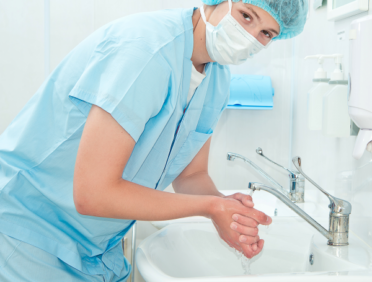Food hygiene safety is an important part of safety in schools. LearnQ is committed to delivering quality qualifications in food hygiene and safety, and this guide will serve as an effective way to identify the basics.
Each section details different areas of food hygiene and safety, as well as what kind of skills staff will be expected to have. LearnQ can provide full training for staff.
What Are the School Food Standards?
It’s important to understand what the School Food Standards are and how they affect meals served to students.
The rules state that you have to serve one or more portions of vegetables or salads as an accompaniment each day. There have to be at least three different fruits and three different vegetables each week. There should be an emphasis on whole-grain foods and making water the main drink.
Portions of fruit juice should be restricted to 150 mL. The amount of added sugars in drinks should be kept to no more than 5%. No more than two portions of food that have been bread-coated, batter-coated or deep-fried can be served each week. Finally, there can be no more than two pastry items each week.
The School Food Regulations 2014 document is an official piece of legislation which mandates how food can be served, what kinds of foods can be served, and how to comply with the regulations as a school. Any school serving food must follow these regulations and train all staff in the correct procedures as outlined in the regulations.
The regulations contain guidance on how to develop suitable portions for children of specific ages, tips on how to maximise the number of nutrients in each meal, and how to prepare healthy meals as part of everyday cooking.
Food Safety Act 1990
The Food Safety Act 1990 is an act of Parliament. It was created as a statutory obligation by any party preparing food to treat said food in a managed, controlled way if meant for human consumption. Schools are legally required to follow this act at all levels of food preparation.
The core tenets of the Food Safety Act include the preparation of food in such a way that does not present harm to the consumer. Other tenets are about the purchasing and storing of food as compliant with government guidelines and the presenting and advertising of food in such a way that it is not misleading or dishonest.
The Eatwell Guide
The Eatwell Guide was designed by the NHS as an official tool for working out what foods should be eaten and in what proportion. The guide puts an emphasis on fruits and vegetables and suggests smaller quantities of sugary foods and drinks.
The guide is frequently followed by schools as it is taught to students as part of the curriculum. Many menus are designed using the guide as a basis, ensuring that students have healthy, balanced, and nutritious meals.
Health and safety law mandates that a school assess risks to students and put appropriate measures in place to protect them. The law also requires risk assessments to be recorded, as well as measures taken to reduce risk and expected outcomes. Contextually, staff might be expected to record risk assessments regarding the preparation of food.
It is recommended that staff receive training in how to properly document and record health and safety responsibilities in schools as to prevent claims of improper food handling, preparation or serving. Staff are expected to be able to provide due diligence for health and safety responsibilities.
Monitoring and Inspection
Monitoring and inspection can refer to detailed assessments being made regarding schools to ascertain their overall effectiveness and compliance with all rules and regulations. A proper regulatory body will be able to verify and provide recommendations to schools regarding their compliance with all rules.
Inspections take place on a regular basis to guarantee that staff are complying with regulations. Monitoring becomes necessary in the event that a school is graded poorly during inspection, and requires closer observation to guarantee compliance and protect students.
Staff Training
Regular staff training is encouraged in schools to make sure that food safety standards are continuously met and maintained. Modern food preparation, storage and serving methods are often modified and changed with time, mandating the need for training.
Staff require regular training to remain compliant with food health and safety standards. New staff will be required to participate in training sessions to be educated on current practices.
Allergies
The proper handling of allergies is vital for health and safety. Adequate knowledge of allergies, how to work with them, and allergy-friendly food preparation will be required to safeguard students from harm.
Allergic reactions to food and drink can be life-threatening. Therefore it is necessary to have a rigid protocol in place to protect students. The school has a responsibility to identify and put in place measures to prevent allergy-related incidents.
Personal Hygiene
Adequate knowledge of personal hygiene is necessary to safeguard students. Personal hygiene must be observed in any situation involving the handling, preparation and serving of food. Hands should be washed, hair tied back, open wounds covered, and staff should not touch their face while preparing food, among other requirements.
Personal hygiene is a core part of food health and safety, and full training should be provided. Any visitors to the kitchen environment should also comply with regulations to ensure the safety and well-being of students.
You can download our free personal hygiene checklist by clicking here.
Cross-Contamination
Training surrounding cross-contamination must be provided to all staff to ensure the welfare and safety of students. The training focuses on providing education as to the dangers of transferring micro bacteria through cross-contamination, how it can be avoided via proper hygiene methods, and the correct procedure should cross-contamination occur.
Hot and Chilled Foods
Full training should be provided to staff on hot and chilled foods. Staff should be able to safely store each type of food in the appropriate place, identify the difference between hot and chilled food, and be able to safely handle each type of food with no risk of cross-contamination or improper handling.
Each type of food should be stored in a safe place according to specific needs. Foods should be kept separate at all times, and individual health and safety codes for each type of food should be followed.
Pest Control
As staff work with food on a regular basis, pest control training is a normal, necessary part of everyday life. Staff members need to be able to identify the warning signs of a pest problem, know how to deal with an issue, and take appropriate steps to contact the relevant professionals to have the pests removed from the area. Training in preventing pest problems is also recommended.
Safe Stock Control
Controlling stock is necessary to keep spending within suitable levels and to avoid excess waste. Staff should be taught essential skills, including how to manage stock responsibly, how to plan with stock purchasing, and how to successfully develop a stock control system that keeps all food fresh and free from contamination.
Safe stock control is as much to do with health and safety as it is with things like financial planning and sustainability.
Sustainability
Sustainability is an important tenet of food hygiene in the modern school environment. Staff need to be able to identify sustainable methods of food preparation, storage, purchase and handling. Training should also be given on how to run a sustainable kitchen, emphasising environmentally conscious business practices and supplier relationships.
How to Keep Temperature Records?
Within the food industry, it is necessary to keep accurate and cohesive records of food temperature to guarantee hygiene and safety. Fridges and freezers should be kept at suitable temperatures to prevent the growth of bacteria, and food needs to be cooked at suitable temperatures to not only kill bacteria but also to make it safe for consumption.
This is accomplished via keeping accurate temperature records as it is a core part of food safety for schools. It is necessary to prove due diligence in the event of illness or harm due to food consumption. It is necessary to be able to receive full training on how to accomplish this in a safe and effective manner.
How to Develop a Cleaning Schedule?
Developing a suitable cleaning schedule is important for maintaining accurate records and complying with all necessary hygiene regulations. Staff will be expected to implement and comply with a rigorous cleaning schedule that has been carefully designed to follow all food health and safety regulations as well as personal hygiene codes.
Full training should be provided in this area to ensure that staff can comfortably and capably design a cleaning and hygiene schedule that will be suitable for school use. Failing to comply with regulations can result in fines or other sanctions, so a cleaning schedule is mandatory. All staff should receive training in cleaning schedules to guarantee health and safety standards are maintained 24/7.
To download a .pdf of this blog, please click here












